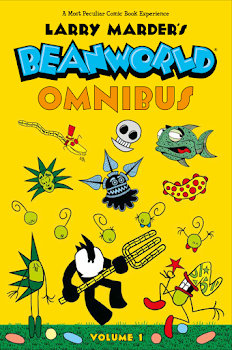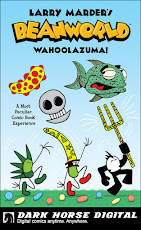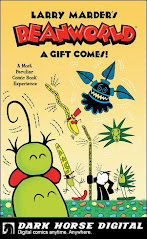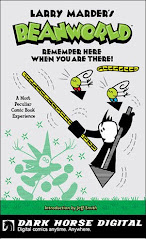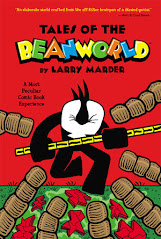Wednesday, September 22, 2010
It's not Tuesday but here's a Teaser!
Sunday, September 19, 2010
Déjà Vu All Over Again.

Panel from "The First Amendment: It's Why We Fight!"
LIBERTY ANNUAL 2010.
This post is about something I care very much about and I'm very proud to be affiliated with.
It's the Comic Book Legal Defense Fund's amicus brief submitted to the Supreme Court of the United States of America. The press release is here.
You can read the brief in its entirety here.
The First Amendment is an elegant bit of prose written a long, long time ago by folks who couldn't possibly imagined the world that we find ourselves living in today.
(see illo above).
Sure the language comes across as a bit quaint but the message is concise:
The Government can't pass laws dictating what an individual can speak or publish. In the United States of America freedom of speech isn't a privilege--it's a right guaranteed by the constitution.
No one is allowed to tell us what we can say or or think.
Not ever.
Of course, that has never stopped people from trying to do otherwise now and again.
That's why the First Amendment, in its tightly written simplicity, is such a valuable part of the Constitution.
Today, I'm here to tell you about how Comic Book Legal Defense Fund is pitching in and as a friend-of-the-court has filed an amicus curiae brief in a case that is soon going to be heard before the Supreme Court of the United States.
That case is called Schwarzenegger v. EMA.
The law that was passed by the state of California and signed into law by Governor Arnold Schwarzenegger bans the sale or rental of any video game containing violent content to minors, and requiring manufacturers to label such games.
The Entertainment Merchants Association (EMA) believes that this law is unconstitutional and has spearheaded the appeal to have the law reversed.
CBLDF thinks so too.
The Board of the Fund (in all fairness I will remind you that I'm its current President) states that if allowed to stand "California’s law would reverse fundamental First Amendment principles by creating a new category of unprotected speech, diminishing the First Amendment rights of minors, and reducing First Amendment protection for new media."
Think about that.
A state legislature gets to create a whole new category of speech that it's decided isn't eligible for protection under the First Amendment and by doing so claims the right to chip away at the free speech rights of people working in a new media as they come along, y'know, like video games.
"The CBLDF argues that the law under review is the most recent example of government improperly attempting to regulate content by using junk science, and calls upon a history of moral panics against media that includes the 1950s crusades against comics that crippled the industry and harmed the art form. The CBLDF asks the Supreme Court to deny California this attempt to roll back protections guaranteed by the First Amendment, as it and other courts have correctly done in the past."
Well, this hits close to home for those of us that love comic books and are painfully aware of what happened almost six decades ago when we were the targets of a similar moral panic. Junk science was provided "indisputable proof "that comic books were harmful to the moral health of America's impressionable Baby Boomers. It was loudly argued in public and private that comic books were a malignant force undermining the very foundations of civilized society in the post war period.
The Business-of-our-Art-Form, as I like to think of the comic book industry, was severely damaged in the 1950s.
Lives were ruined.
Careers destroyed.
The appendix in a history of the era, The Ten-Cent Plague, lists the names of about 1.000 industry professionals who never worked in the medium again. In the prologue of the book, one Quality Comics studio artist, Janice Valleau, when asked why she never worked in the comic book industry again repled: "My God. I couldn't go back out there--I was scared to death. Don't you know what they did to us?"
Comic book creators and publishers were demonized. Junk science was pushed forward in books and in Senate hearings to "prove" that the negative influence of comic books was a primary motivator and root cause of post-war juvenile delinquency.
I oughta know.
I'm one of those kids they were talking about.
I started going to school in 1956 in the direct aftermath of the horrors that destroyed the comic book industry of the 1950s.
It's a story I tell often enough but in 3rd grade, circa, 1959-60, I drew a picture of Batman in crayons at school. This so alarmed my teacher that my parents were called and told that I was well on the road to ruination because I was obsessed with comic books. My mother was horrified , of course, and it wasn't until I was an upperclassman in high school that comics were once again allowed in our home.
Dime novels, early cinema, Jazz, radio, pulp magazines, comic books, Rock & Roll, and now video games all have been accused in one or another of undermining the status quo in a harmful way. When comics were attacked in the 1950s, our industry didn't seem to have any friends.
The targets of moral panics rarely do.
That's why I believe it is so important for everyone who loves the inter-meshing worlds of comics, games, TV, and film to understand just how important it is to defend our First Amendment liberties when they are being attacked or violated.
Don't just take my word for it, listen to someone who lived through it before: Stan Lee who posted on this subject.
"Comic books, it was said, contributed to 'juvenile delinquency.' A Senate subcommittee investigated and decided the U.S. could not 'afford the calculated risk involved in feeding its children, through comic books, a concentrated diet of crime, horror and violence.'
The more things change, as they say, the more they stay the same. Substitute video games for comic books and you've got a 21st century replay of the craziness of the 1950s. States have passed laws restricting the sale of video games and later this year, the Supreme Court will hear a case about one of those laws, this one passed in California. Why does this matter? Because if you restrict sales of video games, you're chipping away at our First Amendment rights to free speech and opening the door to restrictions on books and movies."
That's why so many other organizations are filing amicus briefs in support of EMA. In the past, the CBLDF would often be a co-signer on other amicus briefs. This time, we as a Board, after careful consideration, we concluded that this one hits too close to home. Our collective past experience brings too much to the table.
We've been there.
We've done that.
We want the Supreme Court hear about our history and consider our experiences.
It's our duty as people who are protected by the First Amendment to make sure that everyone else is too.
Because like I said before: the First Amendment isn't a privildege-it's a right.
It can't be taken away.
Or as Jeremy Bentham (the real guy-not the one on LOST) said:
As to the evil which results from a censorship, it is impossible to measure it, for it is impossible to tell where it ends.
---
Protecting the First Amendment isn't cheap.
CBLDF is a grassroots organization that exists because of the generous support of the comics community.
The donations of individuals and small businesses add up to make CBLDF the first responder to First Amendment emergencies when they arise.
Please support the CBLDF’s work by making a monetary contribution and by following us and spreading the word on Twitter and Facebook.
Wednesday, September 1, 2010
Crazy Trade-Ins from Floating World!
Last Tuesday, I made an appearance at Cartoon Art Museum in San Francisco
The Storytime! show is really quite extraordinary and very informative.
We wanted to focus on the process of creating comics and the show really demonstrates how all of the artists in the show work out their stories.
Everyone does it differently.
(Hope Larson's thumbnails are something to see!)
My stuff looked a lot better up on the walls then it did when I was sorting through it on my studio floor. Context is everything, huh?
Duh....I forgot my camera and failed to get any pictures.
The exhibit is up until November 14 and if you are going to APE--you really want to pop in and give the show a look-see.
Then last Wednesday, I did a signing at Floating World Comics in Portland OR.
It was an opportunity to see old friends, make new ones, and have a thoroughly enjoyable evening.
Many thanks to Jason of Floating World for working with Diana Schutz and making the whole thing happen in a very short period of time.
And there were even some particularly excellent Crazy Trade-Ins.


Riley, age 8, wasn't a bit shy to show me her Beanworld originals. She insisted I take several pages because "It's easy to make more." When I asked her who her favorite Beanworld character is, hands down it was "Pod'l'pool Cuties." More of Riley's fantastic artwork here.
 Kids love the Cuties. Doesn't matter what stage the Cuties are in--they are popular as can be.I've written about it before, and will again, but it amazes me how they took over the book and in turn Beanworld fandom. There really needs to be Cutie merchandise of its own--don't you think?
Kids love the Cuties. Doesn't matter what stage the Cuties are in--they are popular as can be.I've written about it before, and will again, but it amazes me how they took over the book and in turn Beanworld fandom. There really needs to be Cutie merchandise of its own--don't you think?
Speaking of merchandise: please post your wish lists of what you most need to have!
We'll speak of this again later
One of the things that also came out of that night was me agreeing to come up again next spring for Stumptown Comic Fest April 16 &17, 2011.
In a day or two, I'll post about something that happened at Floating World that reminded me that a post about the Eclipse Comics hard covers from two decades ago is long over due.




